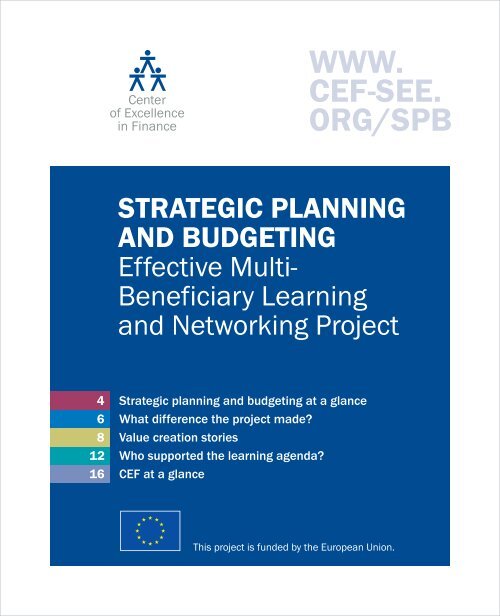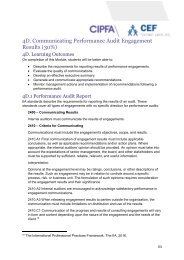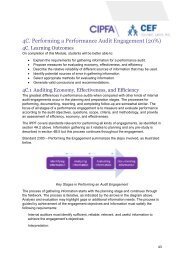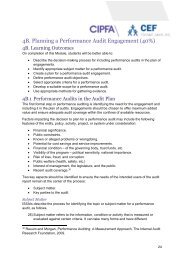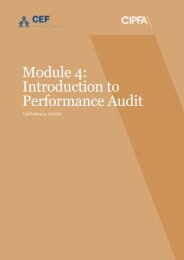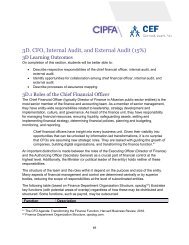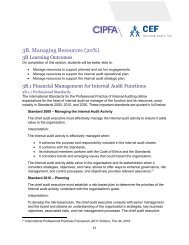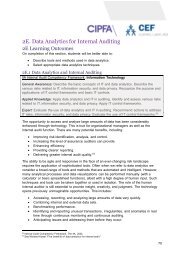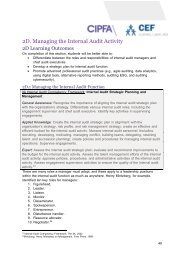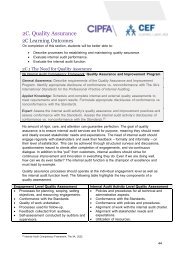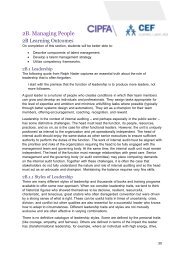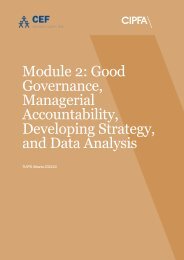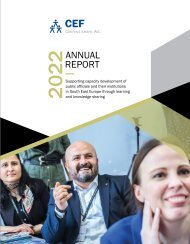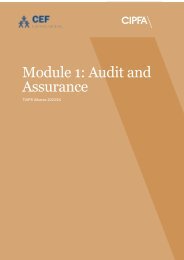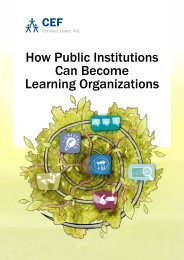Strategic Planning and Budgeting Newspaper
You also want an ePaper? Increase the reach of your titles
YUMPU automatically turns print PDFs into web optimized ePapers that Google loves.
WWW.<br />
CEF-SEE.<br />
ORG/SPB<br />
STRATEGIC PLANNING<br />
AND BUDGETING<br />
Effective Multi-<br />
Beneficiary Learning<br />
<strong>and</strong> Networking Project<br />
4 <strong>Strategic</strong> planning <strong>and</strong> budgeting at a glance<br />
6 What difference the project made?<br />
8 Value creation stories<br />
1 2 Who supported the learning agenda?<br />
16 CEF at a glance<br />
This project is funded by the European Union.
2 www.cef-see.org/spb<br />
www.cef-see.org/spb 3<br />
Dear colleagues,<br />
As South East European countries pursue to<br />
strengthen governance for growth, <strong>and</strong> work toward<br />
EU accession <strong>and</strong> convergence, they face major<br />
challenges to develop <strong>and</strong> implement effective<br />
macroeconomic <strong>and</strong> fiscal policies.<br />
We have delivered 21 EU-funded learning <strong>and</strong><br />
networking activities since 2013, attended by<br />
more than 400 participants. The SPB activities<br />
were implemented in cooperation with our<br />
partners: the International Monetary Fund,<br />
Joint Vienna Institute <strong>and</strong> Regional School<br />
of Public Administration. Our work has been<br />
highly rewarding. Through a series of trainings<br />
we have experienced the dynamic capacity<br />
development of countries in South East Europe<br />
that are preparing for EU accession. We have<br />
learned a lot from local <strong>and</strong> international<br />
experts, <strong>and</strong> have better understood the<br />
specific needs of beneficiaries <strong>and</strong> how to<br />
address them.<br />
The economic <strong>and</strong> financial crisis, which<br />
has affected many emerging markets,<br />
including in the region, underscores the<br />
key role that strongly anchored medium-term<br />
economic <strong>and</strong> fiscal programs need<br />
to play in helping the region’s economies apply<br />
international st<strong>and</strong>ards.<br />
The <strong>Strategic</strong> <strong>Planning</strong> <strong>and</strong> <strong>Budgeting</strong> (SPB)<br />
project that we developed on the initiative<br />
of our beneficiaries has helped strengthen<br />
countries` knowledge <strong>and</strong> skills in responding<br />
to the European Commission’s macrofiscal<br />
surveillance requests.<br />
We have been collecting feedback from the<br />
beneficiaries throughout the project to get firsth<strong>and</strong><br />
information about the project results.<br />
We also headed on a tour in the region to<br />
talk with the beneficiaries in person <strong>and</strong> write<br />
down their stories. To this end, we followed the<br />
Wenger-Trayner conceptual framework on value<br />
created by training activities for participants,<br />
their organizations, <strong>and</strong> stakeholders.<br />
I am pleased that the CEF has considerably contributed<br />
to the region’s capacity development<br />
as a unique cross-link for the project’s donors,<br />
experts, beneficiaries, <strong>and</strong> training experts.<br />
Jana Repanšek, CEF Deputy Director
4 www.cef-see.org/spb<br />
www.cef-see.org/spb 5<br />
<strong>Strategic</strong> planning <strong>and</strong><br />
budgeting at a glance<br />
LEARNING AND NETWORKING<br />
PROJECT<br />
• Implemented between 2013 <strong>and</strong> 2015<br />
• Developed at the request of member<br />
institutions, with input from the European<br />
Commission <strong>and</strong> close involvement of<br />
international financial institutions <strong>and</strong><br />
experts across South East Europe<br />
DESIGNED TO ADDRESS CAPACITY<br />
DEVELOPMENT PRIORITIES<br />
• Ineffective medium-term macroeconomic framework<br />
• Ineffective medium-term fiscal framework<br />
• Insufficient incorporation of structural policies with<br />
national budgets<br />
• Insufficient integration of planning processes <strong>and</strong><br />
reporting in preparation of strategic documents<br />
BENEFICIARIES<br />
• Beneficiary region<br />
EU c<strong>and</strong>idates <strong>and</strong> potential c<strong>and</strong>idates<br />
covered by the IPA 2007–<br />
2013 (Western Balkans + Turkey).<br />
Officials from other South East European countries<br />
(especially Moldova) joined several SPB activities,<br />
as far as space permitted <strong>and</strong> other funding sources<br />
were identified. Their participation supported the regional<br />
exchange of knowledge <strong>and</strong> experience.<br />
IMPLEMENTED BY LEADING<br />
INSTITUTIONS IN CAPACITY<br />
DEVELOPMENT<br />
• Center of Excellence in Finance<br />
• European Union<br />
• International Monetary Fund<br />
• Joint Vienna Institute<br />
• Regional School of Public Administration<br />
FACTS AND FIGURES<br />
TOTAL BUDGET<br />
• EUR 1,000,000 (MB IPA 2012), 2-3 funded places per<br />
beneficiary country <strong>and</strong> activity<br />
• In kind contributions of the IMF, ReSPA <strong>and</strong> several<br />
experts<br />
• Target institutions<br />
Institutions in charge of strategic<br />
planning <strong>and</strong> budgeting processes<br />
(mainly ministries of finance),<br />
budget users (in particular<br />
budget-intensive line ministries)<br />
<strong>and</strong>, to some degree, central planning<br />
authorities, central banks, <strong>and</strong><br />
macroeconomic research institutes<br />
• Target groups<br />
Public administration officials at<br />
top, middle, <strong>and</strong> junior levels involved<br />
in the design, implementation,<br />
<strong>and</strong> coordination of medium-term<br />
macroeconomic <strong>and</strong><br />
fiscal policies<br />
21<br />
activities<br />
delivered, with a total length of<br />
53 days (excluding e-learning)<br />
400+<br />
participants<br />
of which over 320 were<br />
funded by the EU<br />
50+<br />
faculties<br />
involved<br />
10+<br />
experts<br />
from beneficiary countries<br />
30+<br />
SPB Newsfeed<br />
items<br />
20+<br />
value creation<br />
stories<br />
collected
6 www.cef-see.org/spb<br />
www.cef-see.org/spb 7<br />
What difference<br />
the project made?<br />
The SPB<br />
project<br />
helped:<br />
Raise awareness<br />
among top-level<br />
officials coordinating<br />
<strong>and</strong><br />
contributing to<br />
medium-term<br />
macrofiscal<br />
frameworks<br />
about the need<br />
<strong>and</strong> opportunities<br />
to improve<br />
those frameworks<br />
Strengthen<br />
capacities, <strong>and</strong><br />
share experiences<br />
<strong>and</strong> good<br />
practices in the<br />
preparation of<br />
medium-term<br />
macrofiscal<br />
frameworks<br />
Create networks<br />
among officials<br />
involved in the<br />
preparation of<br />
medium-term<br />
macrofiscal<br />
frameworks<br />
Identify <strong>and</strong><br />
train experts<br />
from beneficiary<br />
countries <strong>and</strong> involve<br />
them in the<br />
project`s capacity<br />
development<br />
activities<br />
Improve policy<br />
coordination processes<br />
among<br />
institutions<br />
coordinating <strong>and</strong><br />
contributing to<br />
medium-term<br />
macrofiscal<br />
frameworks<br />
Beneficiaries’<br />
impressions:<br />
We are in the process of adopting<br />
the Fiscal Responsibility Law, so<br />
medium-term budget frameworks<br />
in the context of fiscal rules <strong>and</strong> fiscal<br />
councils will be useful.<br />
The knowledge from the workshop<br />
is very useful for my work, because<br />
we prepare <strong>and</strong> execute the<br />
budget, <strong>and</strong> we also submit reports<br />
to the members of the parliament.<br />
For me, the identification of the<br />
challenges <strong>and</strong> bottlenecks in introducing<br />
a medium-term budget<br />
framework was most helpful.<br />
I gained new knowledge that will<br />
help me be smarter in work-related<br />
discussions, <strong>and</strong> I will also share it<br />
with my colleagues.<br />
My country will implement fiscal<br />
rules <strong>and</strong> establish a fiscal council<br />
in the future <strong>and</strong> I will advise the<br />
ministry in these matters.<br />
The lecturers’ knowledge of the<br />
topic was very good <strong>and</strong> they answered<br />
all our questions.<br />
The lecturers were incredibly good,<br />
with powerful energy during their<br />
presentations.<br />
I will now be able to give more<br />
precise answers to the budget department’s<br />
questions about macro<br />
forecasting.<br />
I have broader knowledge of the<br />
need for medium-term budget<br />
frameworks within line ministries.<br />
I will try to incorporate some of<br />
the things I learned into the writing<br />
of the fiscal strategy (including<br />
the reconciliation table <strong>and</strong> less<br />
aggregate ceilings reported in the<br />
strategy).<br />
The preconditions for medium-term<br />
budgeting also affect the<br />
implementation of institutional<br />
strategic plans. So I will now consider<br />
<strong>and</strong> pay greater attention to<br />
these preconditions.
8 www.cef-see.org/spb<br />
www.cef-see.org/spb 9<br />
We collected value-creation<br />
stories to better underst<strong>and</strong><br />
the impact of<br />
the project activities on<br />
the work of individual participants,<br />
as well as their organizations. According<br />
to the Wenger-Trayner conceptual<br />
framework, a change in behavior<br />
traverses different cycles, providing<br />
an account of how learning initiatives<br />
have created value for participants,<br />
their organizations, <strong>and</strong> stakeholders.<br />
We collect data at different cycles<br />
<strong>and</strong> cross-reference it with the stories<br />
to show the causal link between our<br />
learning initiatives <strong>and</strong> impact on<br />
beneficiary institutions.<br />
The value<br />
created<br />
by<br />
attending<br />
a learning<br />
initiative:<br />
CYCLE 1 CYCLE 2<br />
Starts with describing<br />
the immediate<br />
values:<br />
sharing experience,<br />
meeting<br />
others, sharing<br />
similar challenges,<br />
etc.<br />
Continues with<br />
outlining the<br />
newly created<br />
knowledge capital:<br />
inspiration,<br />
new insights,<br />
new methods &<br />
tools, new connections,<br />
etc.<br />
CYCLE 3<br />
Explains any<br />
application of it<br />
to solve a specific<br />
challenge:<br />
change practice,<br />
start a new collaboration,<br />
apply<br />
a new method,<br />
etc.<br />
CYCLE 4<br />
Finally, the learning<br />
experience<br />
may link to actual<br />
performance<br />
changes that<br />
are meaningful<br />
to participants<br />
<strong>and</strong> their organizations:<br />
improve<br />
personal or<br />
Ministry performance<br />
in area of<br />
budgeting, etc.<br />
CYCLE 5<br />
And may inform<br />
a redefinition of<br />
performance or<br />
reconsideration<br />
of strategies,<br />
goals <strong>and</strong> values:<br />
possible<br />
transformation<br />
in the way things<br />
are done.
10 www.cef-see.org/spb<br />
www.cef-see.org/spb 11<br />
Value creation stories<br />
Milena Milović<br />
Advisor, Budget Directorate, Ministry of Finance, Montenegro<br />
I attended the kick-off SPB event on Strengthening Fiscal Institutions. I found the comparative approach<br />
very useful as it enabled me to deliver a set of comparative models <strong>and</strong> solutions during<br />
drafting of our reformist laws, in particular the Budget Responsibility Law. I also learned about the<br />
experiences of other countries in the region regarding fiscal rules <strong>and</strong> shared that knowledge with<br />
the working group responsible for writing this law in our Ministry of Finance, who will take the regional<br />
experiences in account in further law drafting.<br />
I find it very useful that line ministries participated at the SPB learning events this year, as they benefit<br />
from the trainings equally with the Ministry of Finance.<br />
At the SPB workshops, I experienced that not all countries in South East Europe have sufficient<br />
access to suitable domestic literature <strong>and</strong> coursework on applied economics <strong>and</strong> macroeconomic<br />
forecasting. Especially young professionals have limited options to learn from senior experts, both at<br />
home <strong>and</strong> abroad.<br />
Ivana Jakir Bajo<br />
Head of Budget Execution Department, Ministry of Finance, Croatia<br />
The SPB learning events gave our officials opportunities to network with colleagues from other beneficiary<br />
countries <strong>and</strong> to share good practices, which certainly empowers future cooperation with<br />
colleagues in the region. These events also helped young staff members of the ministry to get a<br />
more profound underst<strong>and</strong>ing of various topics we are working at, which in turn increases their confidence<br />
<strong>and</strong> knowhow, thus preparing them to become future managers at the ministry <strong>and</strong> leaders<br />
of reforms in the region.<br />
Dimitar Točkov<br />
Advisor, Department for Macroeconomic <strong>and</strong> Fiscal Analysis <strong>and</strong><br />
Projections, Ministry of Finance, Serbia<br />
The <strong>Strategic</strong> <strong>Planning</strong> <strong>and</strong> <strong>Budgeting</strong> (SPB) learning experience has extended my professional horizon.<br />
Conversations with the CEF staff – like for such interviews – have helped me reflect on my professional<br />
development in reference to the regional context <strong>and</strong> my country, as well as to the learning<br />
opportunities that are out there. I am now looking more strategically for occasions to engage with<br />
others in learning about macroeconomic issues.<br />
Elton Stafa<br />
Budget Director, Ministry of Finance, Albania<br />
I believe that creating opportunities for professionals from different countries, who face different realities,<br />
to meet <strong>and</strong> exchange ideas, policy advices <strong>and</strong> experiences, is the highest benefit that the CEF<br />
is bringing to the region, in addition to state-of-the-art trainings on budget, macro <strong>and</strong> fiscal issues. I<br />
participated at a CEF workshop, where we discussed new institutions to be created, or existing ones<br />
to be strengthened, to meet the challenges imposed by the global financial crisis. One of the topics<br />
was the creation <strong>and</strong> functioning of economic councils based on the experiences of Croatia, Irel<strong>and</strong><br />
<strong>and</strong> the UK. These experiences have definitively helped us shape our recently established National<br />
Economic Council. One may think it as a matter of luck, being at the right place at the right time.<br />
Or, as me, one may find out that the CEF constantly updates its trainings, workshops <strong>and</strong> seminars<br />
by shaping them to the beneficiaries’ needs <strong>and</strong> anticipating challenges faced by the region in the<br />
aftermath of the global crisis. Thus, I would like to thank the CEF team <strong>and</strong> donors for making these<br />
trainings possible.<br />
Erdogan Yilmaz<br />
Junior Treasury Expert, Undersecretariat of Treasury, Turkey<br />
Continuation <strong>and</strong> extension of the SPB project could benefit more Turkish officials, <strong>and</strong> importantly<br />
contribute to further develop capacity of Turkish institutions. To better carrying out tasks at the Turkish<br />
Undersecretariat of Treasury, it was very useful for me to attend the Capital <strong>Budgeting</strong> workshop.<br />
I learned more about concepts <strong>and</strong> processes of capital budget formulation <strong>and</strong> capital budget execution,<br />
as essential elements for ensuring a country’s social <strong>and</strong> economic development <strong>and</strong> its<br />
financial stability; as well as about good practice in cost-benefit analysis. I also attended the SPB<br />
Training-of-trainers. I enjoyed presenting to other international participants in the classroom, jointly<br />
reflecting on my performance, <strong>and</strong> learning from their feedback. The simulation of giving powerful<br />
presentations, especially in the context of the medium term budgeting framework, was a particularly<br />
memorable experience, as it is part of my daily job to give such presentations.<br />
Kushtrim Kozmaqi<br />
Budget Officer, Ministry of Education, Science <strong>and</strong> Technology, Kosovo*<br />
The workshop on Budget Submissions of Line Ministries made me better underst<strong>and</strong> the main challenges<br />
in budgeting at my ministry <strong>and</strong> other line ministries in the region. At the workshop we did<br />
budget negotiation simulations between a Ministry of Finance <strong>and</strong> line ministries, <strong>and</strong> learned about<br />
the best budgeting practices in developed countries. That helped me strengthen my capacities in<br />
countering bottlenecks, such as papers submitted very late in the budget process, <strong>and</strong> I learned<br />
practices that are used to eliminate such bottlenecks. As a result, I have decided to communicate<br />
more often with the budget organizations under my supervision, so that they could feel my support.<br />
The workshops also strengthened confidence in my daily work. I can now manage time more efficiently<br />
<strong>and</strong> perform better at my job.<br />
Maja Jeličić<br />
Senior Associate, Department for Macroeconomic Analysis <strong>and</strong> Policy,<br />
Ministry of Finance of the Republika Srpska, Bosnia <strong>and</strong> Herzegovina<br />
After returning to the office from the recent CEF-IMF course on medium-term budgeting (Recent Developments<br />
<strong>and</strong> Issues in Medium-Term <strong>Budgeting</strong>), I shared the materials with my colleagues. I very<br />
much appreciate the opportunity given by the CEF to receive h<strong>and</strong>s-on comments on our ongoing<br />
challenges <strong>and</strong> draft laws. Namely, I shared with my colleagues the comments on the Draft Law of<br />
Fiscal Responsibility that is currently at the parliamentary reading. We expect the adoption of this<br />
law by the end of the year <strong>and</strong> subsequent appointment of the Fiscal Council. I also appreciate the<br />
preparatory online reading materials that enabled me to take full advantage of the core training on<br />
macroeconomic forecasting in Montenegro last year.<br />
* The designation of Kosovo is without prejudice to positions on status, <strong>and</strong> is in line with UNSCR 1244/99 <strong>and</strong> the ICJ Opinion on the Kosovo Declaration of Independence.
12 www.cef-see.org/spb<br />
www.cef-see.org/spb 13<br />
Who supported<br />
the learning agenda?<br />
Experts (in alphabetic order)<br />
Taşkin BABAOGLAN #<br />
Sebastian BARNES<br />
Maja BEDNAŠ<br />
Peter van den BERG<br />
Karl BERGSTRAND<br />
Frits BOS<br />
Corina den BROEDER<br />
Luis CATAO<br />
Vesna DERENČIN<br />
Eriona ELEZI QOKU #<br />
Brian FINN<br />
Dritan FINO #<br />
Norbert FUNKE<br />
Adam GERSL<br />
Wijn<strong>and</strong> van GOUDOEVER<br />
Bert HOF<br />
Maksym IVANYNA<br />
Aleks<strong>and</strong>ra IVANOVSKA #<br />
Andreja JERINA<br />
Joanne KELLY<br />
Nora KOKAJ #<br />
Dirk-Jan KRAAN<br />
Duncan LAST<br />
André LUNDVALL<br />
Qemajl MARMULLAKAJ #<br />
Paul MCCLURE<br />
Mojmir MRAK<br />
Frans van NISPEN TOT PANNERDEN<br />
Jos NOUWT<br />
L’udovit ÓDOR<br />
Position (at time of delivery)<br />
<strong>Planning</strong> Expert, Ministry of Development of Turkey<br />
Economic Counsellor to the Chief Economist, OECD; Member of the Irish Fiscal Advisory Council<br />
Macroeconomic Expert, Institute of Macroeconomic Analysis <strong>and</strong> Development, Slovenia<br />
Budget Director, Ministry of Finance, the Netherl<strong>and</strong>s<br />
Ministry of Finance, Sweden<br />
Bureau for Economic Policy Analysis, the Netherl<strong>and</strong>s<br />
Budget Inspectorate, Ministry of Finance, the Netherl<strong>and</strong>s<br />
Senior Economist, Joint Vienna Institute<br />
Senior Advisor, Department for Budget System Development, Ministry of Finance, Slovenia<br />
Financial <strong>Planning</strong> <strong>and</strong> <strong>Budgeting</strong> Expert, Ministry of Transport <strong>and</strong> Infrastructure, Albania<br />
Senior Policy Adviser, OECD Sigma<br />
Advisor to Cabinet of Minister, Ministry of Finance, Albania<br />
Director, Joint Vienna Institute<br />
Senior Economist, Joint Vienna Institute<br />
Inspectorate of Finance, Ministry of Finance, the Netherl<strong>and</strong>s<br />
Senior Researcher, Competition & Regulation Department, SEO Economic Research, the<br />
Netherl<strong>and</strong>s<br />
Economist, Joint Vienna Institute<br />
Head of Budget Coordination Unit, Ministry of Transport <strong>and</strong> Communications, former Yugoslav<br />
Republic of Macedonia<br />
National Coordinator, EU Macroregional Strategies, Ministry of Foreign Affairs, Slovenia<br />
Professor of Public Administration, Australia/New Zeal<strong>and</strong> School of Government<br />
Macroeconomist, Ministry of Finance, Kosovo*<br />
CEF Advisor (former Public Financial Management Advisor for South East Europe, International<br />
Monetary Fund)<br />
Public Financial Management Advisor for South East Europe, International Monetary Fund<br />
Ministry of Finance, Sweden<br />
Director of <strong>Strategic</strong> <strong>Planning</strong> Office, Office of the Prime Minister, Kosovo*<br />
Senior Communications Officer, World Bank Group; CEF Associate Fellow<br />
Professor, University of Ljubljana, Faculty of Economics; CEF Associate Fellow<br />
Associate Professor of Public Administration, Erasmus University, Rotterdam<br />
Ministry of Health, Welfare <strong>and</strong> Sport, the Netherl<strong>and</strong>s<br />
The Council for Budget Responsibility of the Slovak Republic<br />
Brian OLDEN<br />
Bojan PAUNOVIĆ #<br />
Mikhail PRANOVICH<br />
Stephanie RISO<br />
Koert RUIKEN<br />
Marta RUIZ-ARRANZ<br />
Andrea SCHAECHTER<br />
Gerd SCHWARTZ<br />
Majda SEDEJ<br />
Elton STAFA #<br />
Tijana STANKOVIĆ #<br />
Daniel M. STURM<br />
Janez ŠUŠTERŠIC<br />
Eivind TANDBERG<br />
Georges TOURNEMIRE<br />
Christopher TOWE<br />
Mišo VASILEVSKI #<br />
Stane VENCELJ<br />
Mojca VOLJČ<br />
Nina VUJOŠEVIĆ #<br />
Beverly WENGER-TRAYNER<br />
Thomas WILHELMSSON<br />
Sami YLÄOUTINEN<br />
Urška ZRINSKI<br />
#<br />
Expert originates from a beneficiary country.<br />
Project activities were<br />
delivered by several<br />
regional experts.<br />
Deputy Division Chief, Public Financial Management Division I, Fiscal Affairs Department,<br />
International Monetary Fund<br />
Senior Advisor, Ministry of Finance of Montenegro<br />
Economist, Joint Vienna Institute<br />
Head of Unit, Fiscal Policy <strong>and</strong> Surveillance, Economic <strong>and</strong> Financial Affairs, European Commission<br />
Ministry of Infrastructure <strong>and</strong> the Environment, the Netherl<strong>and</strong>s<br />
Deputy Chief, Fiscal Policy Division, Fiscal Affairs Department, International Monetary Fund<br />
Deputy Division Chief, Fiscal Policy <strong>and</strong> Surveillance Division, Fiscal Affairs Department,<br />
International Monetary Fund<br />
Deputy Director, Fiscal Affairs Department, International Monetary Fund<br />
USAID Serbia<br />
Budget Director, Ministry of Finance, Albania<br />
Advisor to Vice Prime Minister for Economic Policy <strong>and</strong> Financial System, Prime Minister Office<br />
of Montenegro<br />
Reader (Associate Professor) in Economics, London School of Economics<br />
Partner <strong>and</strong> consultant at Re-forma, d.o.o.; Senior Economist on the EU-project “Support to<br />
Ministry of Finance”, Kosovo*<br />
Municipality Director, City of Oslo, Norway<br />
DG ECFIN, European Commission<br />
Deputy Director, Fiscal Affairs Department, International Monetary Fund<br />
Head of Budget Control Unit, Ministry of Transport <strong>and</strong> Communications, former Yugoslav<br />
Republic of Macedonia<br />
Ministry of Finance of Slovenia<br />
Undersecretary, Department for Budget System Development, Ministry of Finance, Slovenia<br />
Adviser to the Prime Minister of Montenegro; Docent, University of Donja Gorica, Montenegro<br />
Social Learning Theorist <strong>and</strong> Consultant<br />
Ministry of Finance, Sweden<br />
Director General, Economic Policy Coordination, Ministry of Finance of Finl<strong>and</strong><br />
Program Manager, Center of Excellence in Finance<br />
Several ministers <strong>and</strong> central bank<br />
governors (or their representatives)<br />
participated as speakers at the highlevel<br />
policy dialogues.<br />
The design <strong>and</strong> delivery of SPB<br />
activities have been facilitated by<br />
CEF learning experts.
14 www.cef-see.org/spb<br />
www.cef-see.org/spb 15<br />
Who supported the learning agenda?<br />
Duncan Last<br />
Public Financial Management Advisor for South East<br />
Europe, International Monetary Fund<br />
As a “founding father” of the CEF, I have taken a close <strong>and</strong> personal interest in its<br />
activities, from the experimental workshops in the early days of 2001 to the current<br />
highly experienced deliverer of a wide variety of focused <strong>and</strong> practical “learning<br />
activities” in the areas of public financial management, revenue administration,<br />
central banking, <strong>and</strong> managerial skills to its current constituency of 12 South East<br />
European partner countries. The significant <strong>and</strong> positive transformation made in<br />
the region since the 1990s has delivered 4 new EU member countries <strong>and</strong> brought<br />
the remaining countries closer to their ultimate goal of integration with the EU.<br />
Support for the EU integration agenda is one of the Fiscal Affairs Department’s<br />
(FAD) objectives for its PFM technical assistance program in the region now being<br />
funded from EU resources.<br />
FAD has been an important partner in the design <strong>and</strong> delivery of the EU-funded<br />
SPB project <strong>and</strong> has participated in many of its key events <strong>and</strong> training activities<br />
over the last three years – I have participated in 3 workshops in the 9 months that I<br />
have been regional PFM advisor. Our focus has been on strengthening macro-fiscal<br />
frameworks <strong>and</strong> the underlying fiscal institutions essential to consolidation <strong>and</strong><br />
structural reform efforts in the region. We have found the framework of the SPB<br />
project to be particularly useful <strong>and</strong> productive in conveying FAD global experience<br />
<strong>and</strong> best practices to senior <strong>and</strong> mid-level staff in the region. We look forward to<br />
our on-going collaboration with the CEF in PFM areas of importance to the region<br />
<strong>and</strong> the EU convergence agenda.<br />
Beverly Wenger Trayner<br />
Social Learning Theorist <strong>and</strong> Consultant<br />
I’m always struck by the way the CEF manages to take on complex<br />
problems with a combination of imagination <strong>and</strong> rigor.<br />
This project is an example of that. They have taken a strategic,<br />
operational, <strong>and</strong> enabling approach to developing the capacity<br />
of beneficiary countries in a cutting-edge way.<br />
My role has been to support the project in using a framework<br />
to monitor the value-creation of social learning in the project.<br />
Which activities organized by CEF generate ideas that get put<br />
into practice <strong>and</strong> lead to results? What is the strategic <strong>and</strong> enabling<br />
value created that will help this become a sustainable<br />
project? This is done through an integration of indicators <strong>and</strong><br />
“value-creation stories” which can be fed back into the project<br />
activities as learning loops for improving the process.<br />
Mojmir Mrak<br />
Professor, University of Ljubljana, Faculty of Economics;<br />
CEF Associate Fellow<br />
I have been working with the CEF in the design <strong>and</strong> delivery of training activities<br />
promoting a better use of EU financial instruments to support pre-accession<br />
of (potential) c<strong>and</strong>idate countries in South East Europe. Upon initiative of its<br />
members, the CEF has been addressing learning needs linked to the EU’s macrofiscal<br />
surveillance.<br />
Through the SPB project we contributed to better coordination among relevant<br />
government actors. It was a pleasure to join the productive knowledge <strong>and</strong><br />
experience exchange stimulated among participants through mutual learning as<br />
part of SPB activities. I look forward to work with the CEF on further developing its<br />
learning program to incorporate the needs of different government actors across<br />
different sectors <strong>and</strong> to consolidate PFM reforms with beneficiaries of EU preaccession<br />
agenda.<br />
Mišo Vasilevski<br />
Head of Budget Control Unit, Ministry of<br />
Transport <strong>and</strong> Communications, former<br />
Yugoslav Republic of Macedonia<br />
The CEF invited me to showcase as expert part of my<br />
own work at the workshop on Budget Submissions of<br />
Line Ministries. This was a unique opportunity for me to<br />
strengthen my skills in sharing knowledge, <strong>and</strong> it was a<br />
very rewarding experience to get positive feedback from<br />
my colleagues. We are all experts in our specific fields, <strong>and</strong><br />
work areas, but do not have many opportunities to share our<br />
knowledge <strong>and</strong> expertise internationally.
16<br />
www.cef-see.org/spb<br />
CEF at a glance<br />
Established<br />
We are a leading regional knowledge hub located in Ljubljana, Slovenia.<br />
We were established in 2001 under the Stability Pact for South East Europe<br />
by the Slovenian Government at the initiative of the Slovenian Ministry<br />
of Finance <strong>and</strong> in close cooperation with other ministries of finance<br />
of former Yugoslav countries <strong>and</strong> Albania. In 2014 the CEF became an<br />
international organization. This status will enable us to further improve<br />
the quality of our programs <strong>and</strong> projects.<br />
Our mission<br />
To support capacity development in public financial management <strong>and</strong><br />
central banking topics for individuals <strong>and</strong> institutions. We do this by<br />
designing high-quality, practical, <strong>and</strong> learning-centered specialization<br />
programs <strong>and</strong> learning events; by promoting networks of professionals;<br />
<strong>and</strong> by stimulating regional cooperation. We partner with multilateral <strong>and</strong><br />
bilateral agencies, knowledge institutions, <strong>and</strong> peer organizations, <strong>and</strong><br />
we tap the expertise of a broad range of individual experts.<br />
Our advantage<br />
We underst<strong>and</strong> that we need to combine expertise in public financial<br />
management <strong>and</strong> central banking <strong>and</strong> contextual specifics of countries<br />
we work with, but also to have a good comprehension of how reforms<br />
take place, <strong>and</strong> how to nourish <strong>and</strong> expedite learning among individuals,<br />
institutions <strong>and</strong> countries in the region.<br />
We serve<br />
Albania, Bosnia <strong>and</strong> Herzegovina, Bulgaria, Croatia, Kosovo*, former Yugoslav<br />
Republic of Macedonia, Moldova, Montenegro, Romania, Serbia,<br />
Slovenia, <strong>and</strong> Turkey. With the change of CEF legal status to an international<br />
organization all remain beneficiaries of the CEF program.<br />
Cankarjeva 18<br />
1000 Ljubljana<br />
Slovenia<br />
T: +386 1 369 6190<br />
F: +386 1 369 6244<br />
info@cef-see.org<br />
www.cef-see.org<br />
© 2015, Center of Excellence in Finance (CEF) All rights reserved. | Published by: Center of Excellence in Finance | 2nd Edition | Funded by the European Union | Design: Sonja Eržen | Printing: Tiskarna Medium<br />
@CEF_Ljubljana<br />
Us on Facebook<br />
Add your CEF<br />
accomplisments to<br />
your LinkedIn profile<br />
Follow coverage<br />
of CEF learning<br />
activities on Storify<br />
View our videos on<br />
Subscribe to our<br />
newsletter at<br />
www.cef-see-org.


